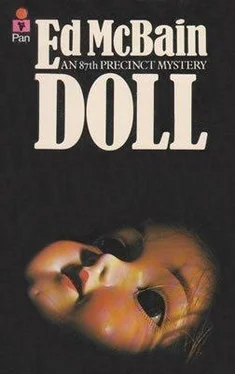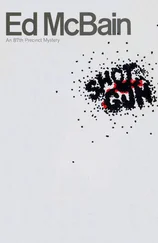Ed McBain - Doll
Здесь есть возможность читать онлайн «Ed McBain - Doll» весь текст электронной книги совершенно бесплатно (целиком полную версию без сокращений). В некоторых случаях можно слушать аудио, скачать через торрент в формате fb2 и присутствует краткое содержание. Город: London, Год выпуска: 1976, ISBN: 1976, Издательство: Pan, Жанр: Полицейский детектив, на английском языке. Описание произведения, (предисловие) а так же отзывы посетителей доступны на портале библиотеки ЛибКат.
- Название:Doll
- Автор:
- Издательство:Pan
- Жанр:
- Год:1976
- Город:London
- ISBN:978-0330248235
- Рейтинг книги:3 / 5. Голосов: 1
-
Избранное:Добавить в избранное
- Отзывы:
-
Ваша оценка:
- 60
- 1
- 2
- 3
- 4
- 5
Doll: краткое содержание, описание и аннотация
Предлагаем к чтению аннотацию, описание, краткое содержание или предисловие (зависит от того, что написал сам автор книги «Doll»). Если вы не нашли необходимую информацию о книге — напишите в комментариях, мы постараемся отыскать её.
Doll — читать онлайн бесплатно полную книгу (весь текст) целиком
Ниже представлен текст книги, разбитый по страницам. Система сохранения места последней прочитанной страницы, позволяет с удобством читать онлайн бесплатно книгу «Doll», без необходимости каждый раз заново искать на чём Вы остановились. Поставьте закладку, и сможете в любой момент перейти на страницу, на которой закончили чтение.
Интервал:
Закладка:
We begin treatment again tomorrow morning. This time I insisted that a nurse remain with her for at least two weeks.
We will be starting from scratch.
February 9
We have made excellent progress in the past five days. The morphine injections have been reduced to ⅛ grain four times daily, and tomorrow we begin alternating with codeine.
Tinka talked about her relationship with her husband for the first time today, in connection with her resolve to break the habit. He is apparently an archaeologist working with an expedition somewhere in Arizona. She is in frequent touch with him, and in fact called him yesterday to say she had begun treatment and was hopeful of a cure. It is her desire, she said, to begin a new life with him once the withdrawal is complete. She knows he still loves her, knows that had it not been for her habit they would never have parted.
She said he did not learn of her addiction until almost a year after the child was born. This was all the more remarkable since the baby — fed during pregnancy by the bloodstream of her mother, metabolically dependent on heroin — was quite naturally an addict herself from the moment she was born. Dennis, and the family pediatrician as well, assumed she was a colicky baby, crying half the night through, vomiting, constantly fretting. Only Tinka knew that the infant was experiencing all the symptoms of cold-turkey withdrawal. She was tempted more than once to give the child a secret fix, but she refrained from doing so, and the baby survived the torment of force withdrawal only to face the subsequent storm of separation and divorce.
Tinka was able to explain the hypodermic needle Dennis found a month later by saying she was allergic to certain dyes in the nylon dresses she was modeling and that her doctor had prescribed an antihistamine in an attempt to reduce the allergic reaction. But she could not explain the large sums of money that seemed to be vanishing from their joint bank account, nor could she explain his ultimate discovery of three glassine bags of a white powder secreted at the back of her dresser drawer. She finally confessed that she was a drug addict, that she had been a drug addict for close to seven years and saw nothing wrong with it so long as she was capable of supporting the habit. He goddamn well knew she was earning most of the money in this household, anyway, so what the fuck did he want from her?
He cracked her across the face and told her they would go to see a doctor in the morning.
In the morning, Tinka was gone.
She did not return to the apartment until three weeks later, disheveled and bedraggled, at which time she told Dennis she had been on a party with three coloured musicians from a club downtown, all of them addicts. She could not remember what they had done together. Dennis had meanwhile consulted a doctor, and he told Tinka that drug addiction was by no means incurable, that there were ways of treating it, that success was almost certain if the patient — Don’t make me laugh, Tinka said. I’m hooked through the bag and back, and what’s more I like it, now what the hell do you think about that? Get off my back, you’re worse than the monkey!
He asked for the divorce six months later.
During that time, he tried desperately to reach this person he had taken for a wife, this stranger, who was nonetheless the mother of his child, this driven animal whose entire life seemed bounded by the need for heroin. Their expenses were overwhelming. She could not let her career vanish because without her career she could hardly afford the enormous amounts of heroin she required. So she dressed the part of the famous model, and lived in a lavishly appointed apartment, and rode around town in hired limousines, and ate at the best restaurants, and was seen at all the important functions — while within her the clamour for heroin raged unabated. She worked slavishly, part of her income going toward maintaining the legend that was a necessary adjunct of her profession, the remainder going toward the purchase of drugs for herself and her friends.
There were always friends.
She would vanish for weeks at a time, lured by a keening song she alone heard, compelled to seek other addicts, craving the approval of people like herself, the comradeship of the dream society, the anonymity of the shooting gallery where scars were not stigmata and addiction was not a curse.
He would have left her sooner but the child presented a serious problem. He knew he could not trust Anna alone with her mother, but how could he take her with him on archaeological expeditions around the world? He realized that if Tinka’s addiction were allowed to enter the divorce proceedings, he would be granted immediate custody of the child. But Tinka’s career would automatically be ruined, and who knew what later untold hurt the attendant publicity could bring to Anna? He promised Tinka that he would not introduce the matter of her addiction if she would allow him to hire a responsible governess for the child. Tinka readily agreed. Except for her occasional binges, she considered herself to be a devoted and exemplary mother. If a governess would make Dennis happy and keep this sordid matter of addiction out of the proceedings, she was more than willing to go along with the idea. The arrangements were made.
Dennis, presumably in love with his wife, presumably concerned about his daughter’s welfare, was nonetheless content to abandon one to eternal drug addiction, and the other to the vagaries and unpredictabilities of living with a confirmed junkie. Tinka, for her part, was glad to see him leave. He had become a puritanical goad, and she wondered why she’d ever married him in the first place. She supposed it had had something to do with the romantic notion of one day kicking the habit and starting a new life.
Which is what you’re doing now, I told her.
Yes, she said, and her eyes were shining.
February 12
Tinka is no longer dependent on morphine, and we have reduced the codeine intake to one grain twice daily, alternating with ½ grain twice daily.
February 13
I received a long-distance call from Dennis Sachs today. He simply wanted to know how his wife was coming along and said that if I didn’t mind he would call once a week — it would have to be either Friday or Saturday since he’d be in the desert the rest of the time — to check on her progress. I told him the prognosis was excellent, and I expressed the hope that withdrawal would be complete by the twentieth of the month.
February 14
Have reduced the codeine to ½ grain twice daily, and have introduced thiamine twice daily.
February 15
Last night, Tinka slipped out of the apartment while her nurse was dozing. She has not returned, and I do not know where she is.
February 20
Have been unable to locate Tinka.
March 1
Have called the apartment repeatedly. The governess continues to care for Anna — but there has been no word from Tinka.
March 8
In desperation, I called the Cutler Agency today to ask if they have any knowledge of Tinka’s whereabouts. They asked me to identify myself, and I said I was a doctor treating her for a skin allergy (Tinka’s own lie!). They said she had gone to the Virgin Islands on a modeling assignment and would not be back until the twentieth of March. I thanked them and hung up.
March 22
Tinka came back to my office today.
The assignment had come up suddenly, she said, and she had taken it, forgetting to tell me about it.
I told her I thought she was lying.
AH right, she said. She had seized upon the opportunity as a way to get away from me and the treatment. She did not know why, but she had suddenly been filled with panic. She knew that in several days, a week at most, she would be off even the thiamine — and then what would there be? How could she possibly get through a day without a shot of something?
Читать дальшеИнтервал:
Закладка:
Похожие книги на «Doll»
Представляем Вашему вниманию похожие книги на «Doll» списком для выбора. Мы отобрали схожую по названию и смыслу литературу в надежде предоставить читателям больше вариантов отыскать новые, интересные, ещё непрочитанные произведения.
Обсуждение, отзывы о книге «Doll» и просто собственные мнения читателей. Оставьте ваши комментарии, напишите, что Вы думаете о произведении, его смысле или главных героях. Укажите что конкретно понравилось, а что нет, и почему Вы так считаете.












